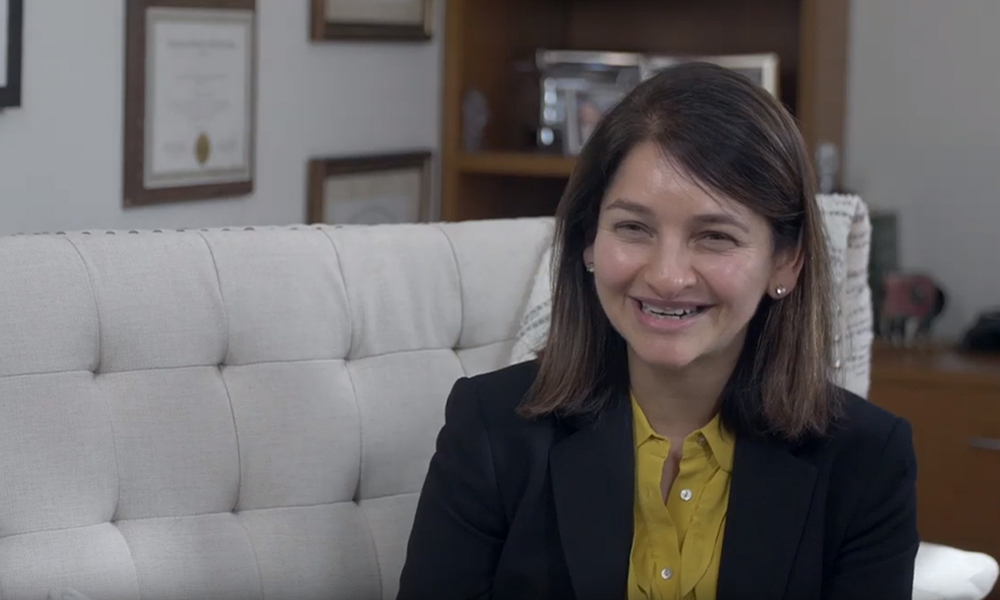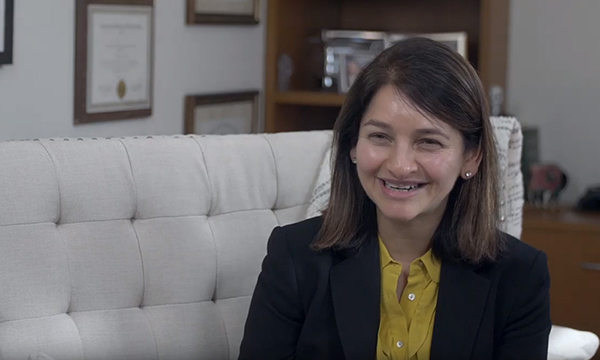The Visionary Future of CAR T-Cell Therapy
Noopur Raje, MD, Marcela Maus, MD, PhD and Matthew Frigault, MD discuss the power and evolution of immune therapies, specifically, CAR T-Cell therapy in treating cancer.
Mass General Brigham Cancer Institute
Contact Information
Support the Center for Multiple Myeloma
Help our team at the Center for Multiple Myeloma advance research and provide comprehensive care for patients with multiple myeloma. Make a gift.
The Center for Multiple Myeloma provides comprehensive treatment for all stages of multiple myeloma and a condition called MGUS, or monoclonal gammopathy of undetermined significance. MGUS can progress to become multiple myeloma. We also treat patients with related plasma cell disorders, including:
We tailor treatment to each individual patient. Each member of our multidisciplinary care team has special expertise in treating this particular kind of cancer.
The Center for Multiple Myeloma provides comprehensive clinical care in a compassionate and caring environment. Our patients receive:
Every patient in the Center for Multiple Myeloma has a multidisciplinary care team of specialists who coordinate and oversee his or her care. Members of a patient's care team might include:
Correct diagnosis of each patient’s cancer is critical to treatment planning. Specialists in the Center for Multiple Myeloma treat a large number of patients, and our pathologists examine a corresponding large number of tissue samples. This enables each pathologist to develop specialized knowledge about cancer types and to keep up-to-date on new research. Our pathologists are routinely consulted by pathologists around the country for help with challenging cases. Our pathologists conduct evaluations of samples to offer second opinions through state-of-the art technology, including:
Novel therapies, both on their own and in combination with other drugs, are a major component of treatment for multiple myeloma. Our center provides access to the latest clinical trials with novel combinations.
In cases where cancer has greatly affected a patient’s bones, particularly the spine, radiation therapy may be prescribed in addition to chemotherapy. External beam radiation therapy may help ease the pain of weakened bones while also attacking the cancer cells in the bone marrow.
While surgery is not a standard therapy for multiple myeloma, orthopedic surgeons are often members of a patient’s care team. Our program works closely with orthopedic surgeons who are specialized in caring for patients whose bones have become weakened or fractured by multiple myeloma. Orthopedic surgeons are also skilled in recognizing signs of disease in damaged bones and are often instrumental in diagnosing this type of cancer. Some patients with multiple myeloma may benefit from bone marrow transplantation, which is discussed during initial meetings with a patient’s team.
Clinical trials are research studies of new drugs, new combinations of drugs or already approved drugs being studied to treat patients in new/different ways. They may include new drug doses or new ways (schedules) to give the drugs. Clinical trials are run under strict guidelines. Their purpose is to help find out whether new cancer treatments are safe and effective or better than the standard (current) treatment. At Mass General Brigham Cancer Institute, there are several clinical trials open for the treatment of multiple myeloma that use the latest in cancer treatments.
Cancer is increasingly becoming a disease in which the genetic make-up of each individual cancer drives therapy. The Center for Multiple Myeloma also has access to clinical trials involving these targeted therapy approaches.
Mass General Brigham Cancer Institute is an authorized treatment center for Abecma, the FDA approved CAR T-cell therapy for adult patients with multiple myeloma.
What is immunotherapy and how is CAR T-cell therapy, a type of immunotherapy, used to treat multiple myeloma? Andrew Yee, MD explains what multiple myeloma is, and why CAR T-cell therapy is becoming a standard treatment for this rare blood cancer.
What is multiple myeloma and who is most at risk? Learn how the search for a cure has led to advances in multiple myeloma treatment.
See a day in the life of physician-researcher Noopur Raje, MD, Clinical Director of the Center for Multiple Myeloma at the Cancer Institute, and learn about how patients are at the heart of what drives her to bring her best every single day.
Tess Lopes
After a diagnosis of multiple myeloma at 35, Tess fought through complications including kidney failure and treatment resistance. With her care team, she focused on fertility preservation alongside advanced therapies, including CAR T-cell therapy. Today, she’s in remission and focused on her future.
Multiple myeloma is a rare cancer that affects plasma cells, a type of white blood cell.
Learn about radiation oncology at Mass General.
Learn about the Mass General Orthopaedic Oncology service.
Learn about CAR T-Cell Therapy and how it works.
Learn about our Bone Marrow Transplant program.
Provides patients with comprehensive cancer diagnosis in one location.
Discover our Lifestyle Medicine program and it's various offerings.
This program offers free wellness services for patients with cancer and their loved ones.
This program help patients with cancer regain physical abilities & maintain independence.
Our team of registered dietitians provide evidenced based, expert nutrition counseling.
View additional resources provided by our team for patients with multiple myeloma or other plasma cell disorders.
Patients can refill their lenalidomide/pomalidomide one of two ways:
View inspiring cancer survivor stories from Mass General Brigham Cancer Institute’s community of patients, families, and staff.
Our support programs can help patients and their families cope with the challenges of a cancer diagnosis.
Noopur Raje, MD, Marcela Maus, MD, PhD and Matthew Frigault, MD discuss the power and evolution of immune therapies, specifically, CAR T-Cell therapy in treating cancer.
Contact us to make an appointment or to learn more about our programs.


